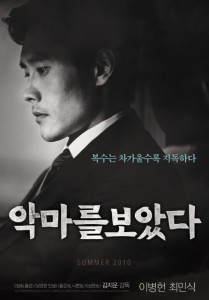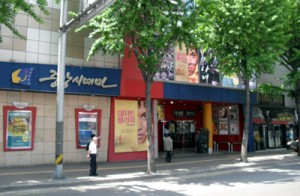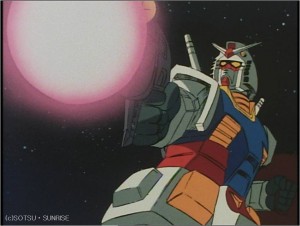So I have seen both of the big new thrillers, Lee Jeong-beom’s THE MAN FROM NOWHERE (aka Ajeosshi) and Kim Jee-woon’s I SAW THE DEVIL. Both are silly, ultra-violent revenge thrillers, but despite their apparent similarities, the they could not feel more different.
AJEOSSHI is a ridiculous film that takes great liberties with logic and physics, but at times was good fun (the fight scenes in particular). It is the story of a mysterious loner (played by Won Bin) who gets sucked into a war with a crime syndicate after his neighbor steals some drugs. Nothing makes much sense in the movie, and the whole film is basically an excuse for Won Bin, a quiet guy who is really a superagent with a secret past, to go Jason Bourne on some very bad people.
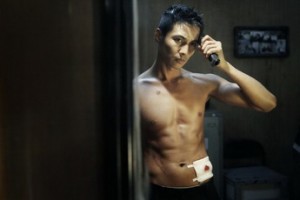
Most of the fight scenes are well done, and a couple times the director suddenly seemed inspired and broke out the creative camera work (I quite liked a tracking shot as Won Bin jumped through a third-storey window). Thai actor Thanayong Wongtrakul has a good presence and handles his action duties really well (although, like much else in the movie, his character does not really make much sense). I do not understand all the praise Won Bin has gotten for his acting in this movie; he is okay but nothing special. His abs look good when he shaves his head, which I think is the important thing.
I SAW THE DEVIL is much darker than AJEOSSHI, and about as violent as a movie can get. It has some inspired moments, too, but the whole film is turned up to 11, and when it gets silly, it gets really silly. Gyeong-cheol (Choi Min Shik) is a brutal serial killer/rapist who murders the fiance of Su-hyeon (Lee Byung-hun), so Su-hyeon decides to take his revenge on the killer.
The opening 10 minutes or so make the film look like it is going to be a fantastic horror film, as Kim Jee-woon builds a dark, terrifying mood. But then Kim goes too far, and the music builds and builds into mawkish melodrama — and then, just when he has gone too far, someone drops the box containing the head of Su-hyeon’s fiance, it bounces out of the box and rolls across the ground by his feet. While hundreds of photojournalists snap away. Seriously. You will laugh, but the scene is not really meant to be funny.
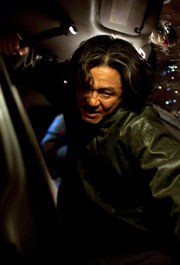
For the first hour, DEVIL unfolds just about exactly how you expect it would. Except it is happening way too quickly, and by the one-hour point, Su-hyeon is where you think the movie should end. But it does not end, and suddenly takes a very surprising and odd turn.
Like AJEOSSHI, DEVIL has some great sequences. Really, some of Kim’s best. The big two action scenes are incredibly engaging and fun (if that is the right word for a film this dark). The second big action scene in particular is great and you think the movie is over — but it is not done. Somehow, the bad guy gets away and the film continues on for another 30 silly, dreary minutes.

Do not expect any psychology here. Gyeong-cheol is just an evil, killing machine who cannot control himself for five minutes. How he got to be middle-aged, I have no idea. In fact, a whole bevy of murders turn up throughout the movie (was there a convention going on?) without any explanation. The police are especially useless. Female characters exist only to be raped and killed. In fact, there is a strange fixation on sexuality in general, with a porn-watching criminal and a slutty cannibal (although the cannibalism was deleted from the official cut, you can figure out where it was pretty easily).
DEVIL is also unbelievable and excessive to the extreme. A character gets his Achilles tendon severed, but continues walking (just with a limp). Gyeong-cheol is somewhere between Jason of Friday the 13th and the Terminator. Blood flows and gushes and pops and sprays in endlessly inventive and gory ways (director Kim is incredibly creative in this regard, and there are times you will admire the carnage, if you can stomach it).
It is strange, then, given how similar the two movies are in so many ways, how differently they feel. AJEOSSHI is basically a feel-good superhero movie. DEVIL is dark, dark, dark, so much so it often becomes comic. Audiences seem to be having the same reaction — last weekend, DEVIL opened in No. 2 with just over 4 billion won; AJEOSSHI, in its second week, held onto the No. 1 spot, with 5.9 billion won, bringing its total to 18 billion.
(Incidentally, INCEPTION continues to kick butt in Korea. It was third last weekend, adding 3.2 billion won to bring its one-month total to 35.7 billion won).
UPDATE: In response to the request in the comment below, I should mention that both Lee Byung-hun and Choi Min-shik give very strong performances in DEVIL. Lee is particular is very subtle and does a great job, although the film did not give him that much to do — most of the time his character is very passive and lurking, tracking Choi. His character is quite enigmatic and his feelings and thoughts are not well explained. But Lee does very well with what little he has to work with, deepening a thin character.
Choi has the much bigger role, and by nature it is a scenery-chewer — and in general, Choi has always been great at diving into a role and making it bigger-than-life. I am tempted to say Choi overdoes it in DEVIL, but that is the point of the character, isn’t it?
So high marks to both actors, especially Lee. And most of the individual sequences in DEVIL are excellent — really, when director Kim wants to evoke horror or be funny or have action, he nails it. The problems with the film are mostly in the story itself, which is sloppy, inconsistent and very ugly.
Oh, and the link in the second comment goes to the English translation of a good interview with LBH in 10 ASIA magazine (the very good TV and entertainment magazine run by the charming Una Baek).
